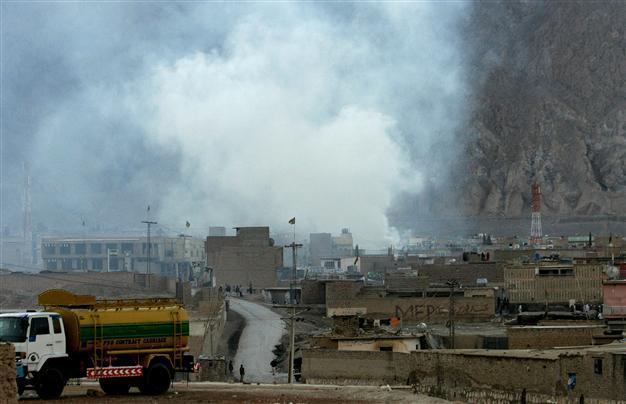Pakistani city mourns after bomb kills 81
QUETTA, Pakistan - Agence France-Presse

Smoke rises from the site of a bomb blast in a market in Quetta, Pakistan on Saturday, Feb. 16, 2013. Senior police officer Wazir Khan Nasir said the bomb went off in a Shiite Muslim-dominated residential suburb of the city of Quetta. Residents rushed the victims to three different hospitals. AP photo
The death toll from a devastating bomb attack on Shiite Muslims in southwest Pakistan rose to 81 Sunday, as the community threatened protests if swift action was not taken against the killers.The bomb containing nearly a tonne of explosives, hidden in a water tanker, tore through a crowded market in Hazara town, a Shiite-dominated area on the edge of Quetta, the capital of Baluchistan province, early on Saturday evening.
The death toll from the blast, which demolished a nearby two-storey building, rose to 81 overnight, senior police official Wazir Khan Nasir told AFP, while 178 people were wounded.
Baluchistan has increasingly become a flashpoint for the surging sectarian violence between Pakistan's majority Sunni Muslims and Shiites, who account for around a fifth of the country's 180 million people.
Saturday's attack takes the death toll in sectarian attacks in Pakistan this year to almost 200, compared with more than 400 in the whole of 2012 -- a year which Human Rights Watch described as the deadliest on record for the country's Shiites.
It was the second major attack on Shiites in Quetta this year, after a double suicide bombing on a snooker club in the city on January 10 killed at least 92 people, the deadliest ever attack on the community in Pakistan.
Protests in the wake of the snooker hall attack prompted Islamabad to sack the provincial government and suspend its legislature and Shiite leaders said there would be more demonstrations if the culprits behind the market bombing were not caught.
Azizullah Hazara, chairman of the Hazara Democratic Party, Sunday gave a 48-hour deadline to the provincial government to launch targeted operations against the killers or they would launch protests.
Provincial home secretary Akbar Hussain Durrani said the dead and injured included women and children, and confirmed all the people trapped under rubble at the site of the collapsed building had been removed.
Durrani said that after clearance from doctors some 25-30 seriously wounded people would be airlifted to Karachi.
The chairman of the Shia Conference, Daud Agha, put the death toll at 83 and 194 wounded.
"Today a special mourning ceremony for the martyrs of last month's attack was already planned. We will announce the future course of action and time for burials after that in the afternoon," Agha told AFP.
The banned militant group Lashkar-e-Jhangvi (LeJ) claimed responsibility for Saturday's attack -- as it did for the snooker hall bombing and a February 1 attack on a Shiite mosque in northwest Pakistan that killed 24.
There is anger and frustration among Shiites at the apparent inability or unwillingness of the authorities to tackle LeJ. Activists say the failure of the judiciary to prosecute sectarian killers allows them to operate with impunity.
Sayed Qamar Haider Zaidi, a spokesman for Shiite groups in the area, condemned the Pakistani government for not providing protection to the community and announced three days of mourning and protest over the attack.
A large number of people gathered outside shops destroyed in the bombing and shopkeepers sifted through the debris to salvage any usable items on Sunday, an AFP photographer at the scene said, adding that people wept as they found human flesh and pieces of limbs.
Pakistan's national flag was flying at half mast after the provincial government declared a day of mourning over the killings and markets were closed.
Baluchistan, which borders Iran and Afghanistan, also suffers Islamist militancy and a regional insurgency which began in 2004, with rebels demanding political autonomy and a greater share of profits from the region's natural resources.
















